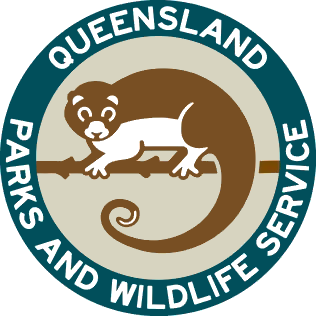Queensland Parks and Wildlife Service
 | |
| Division overview | |
|---|---|
| Formed | December 1975 |
| Type | Protected area management |
| Jurisdiction | Queensland |
| Headquarters | 400 George Street, Brisbane |
| Minister responsible |
|
| Division executive |
|
| Parent department | Department of Environment and Science |
| Website | www |
The Queensland Parks and Wildlife Service (QPWS) is a business division of the Department of Environment and Science within the Government of Queensland. The division’s primary concern is with the management and maintenance of protected areas within Queensland, to protect and manage Queensland’s parks, forests and the Great Barrier Reef for current and future generations.
The QPWS managed areas include more than 1000 national parks, state forests, marine parks and other protected areas, and five world heritage areas. Of these, 220 are national parks.[when?]
Queensland’s first national park, Witches Falls (in today’s Tamborine National Park), was established on 28 March 1908, followed by Bunya Mountains National Park in July 1908, and then Lamington National Park in 1915. From modest early beginnings within the Forestry department, a dedicated national parks service was established in 1975—the Queensland Parks and Wildlife Service. From that time, park rangers have proudly worn QPWS uniform badge featuring the symbol, Herbie (Herbert River ringtail possum), which has become one of the most well-recognised symbols in Queensland.
The Nature Conservation Act 1992, Marine Parks Act 2004 and Forestry Act 1959 provide guiding legislation for the service. Leanne Linard, Minister for Environment and the Great Barrier Reef is responsible for the department. The agency's head office is located at 400 George Street in the Brisbane central business district.
Functions
[edit]Protected areas in Queensland are needed to provide wildlife habitat to maintain biodiversity and provide opportunities for outdoor nature-based activities.[1] Managing national parks involves protecting a park's natural condition and processes, presenting the park's cultural and natural resources and its values; and ensuring that park use is nature-based and ecologically sustainable.[2]
Managing multiple-use marine parks involves providing refuge areas for species and ecosystems while allowing for continuing recreational and commercial use of the majority of the marine environment.[1]
A Master Plan for Queensland's Park System outlines the directions for management of all protected areas in Queensland for the next 20 years.
QPWS is responsible for day-to-day management of Queensland’s five World Heritage areas, which are (mostly) within the protected area estate. These properties are outstanding examples of the world's natural or cultural heritage, and provide highly valuable environmental, tourism and economic services for Queensland.[3]
For each park, either a management statement or a management plan is prepared to identify the park's special values and determine ways to ensure those values are preserved, enhanced[1] or maintained.
The service employs park rangers who are responsible for constructing and maintaining infrastructure such as camping areas, picnic areas, amenities, walking tracks and lookouts providing advice to visitors, recording wildlife data, controlling feral plants and animals, assisting in the preparation of management plans and enforcing park rules.[4]
QPWS also works closely with Aboriginal Traditional Owners and, in some places, volunteers, as well as other government departments and organisations to conserve, manage, share and present Queensland’s most precious natural and cultural places.
In addition to its ranger capability, the QPWS also provides a firefighting service, QPWS Fire Management, that operates within National Parks, State Parks and Conservation parks, among others. QPWS Fire Management conducts both hazard reduction burns alongside responding to other fires within its area.
Uniform
[edit]Rangers wear either khaki long or short sleeved shirts with dark trousers or shorts and boots. Rangers are also permitted to wear a QPWS branded baseball cap, QPWS branded giggle hat, or QPWS branded broad brimmed hat. Both shirts feature the QPWS logo on both shoulders.
Rangers engaging in firefighting duties wear green bunker gear with "PARKS" written across the upper back, along with the QPWS logo on both shoulders.
Vehicles
[edit]QPWS operate primarily the Toyota Land Cruiser 79 Series and Mercedes-Benz G-Class light attack appliances.. QPWS also has a small amount of medium and heavy attack appliances based on an Isuzu or Hino chassis, such as the Isuzu Forward and Hino 500. All vehicles operated by the QPWS feature the words "RANGER", the Queensland Government logo and QPWS logo, along with a large amount of green and yellow battenburg markings. Fire Management vehicles can be identified by the presence of firefighting equipment and the addition of "FIRE" below the regular logos and "RANGER" text.
QPWS vehicles are also fitted with green and amber emergency lighting.


See also
[edit]- Wildlife Preservation Society of Queensland
- NSW National Parks & Wildlife Service
- Parks Victoria
- Tasmania Parks and Wildlife Service
- National Parks and Wildlife Service South Australia
- Department of Parks and Wildlife (Western Australia)
- Parks and Wildlife Commission of the Northern Territory
References
[edit]- ^ a b c "Managing protected areas". Department of Environment and Science. 2 November 2016. Retrieved 31 October 2018.
- ^ "Principles". Department of Environment and Science. 6 March 2014. Retrieved 31 October 2018.
- ^ "World Heritage". Department of Environment and Science. 15 December 2017. Retrieved 31 October 2018.
- ^ "Queensland scene". Department of Science. 16 June 2016. Retrieved 31 October 2018.